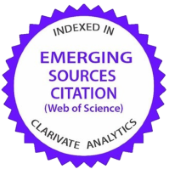Labour Migration and Tourism Flows: the Case of the EU
DOI:
https://doi.org/10.29036/jots.v13i24.374Abstract
During the last decades, the deepening of globalisation has led to an intensification of two forms of international human mobility – tourism and migration. Considering the high proportion of migrant workers in the tourism industry, migration’s possible negative or positive impact on international tourism comes to the forefront. The current article aims to explore the influence of migration, including labour migration, on tourism flows and the impact of tourism flows and migration on the labour market both in donor and host countries. The statistical basis of the analysis was the annual panel data on labour market and tourism indicators for selected EU member states. We have built three panel data econometric models on 17 member states of the European Union on the data from 2005 to 2019. The results suggest that migration and labour migration are significant factors for international tourism and the labour market, with immigration positively impacting both the tourism industry and labour market. At the same time, emigration has a negative effect mainly due to the possible “brain drain” in the donor countries. On the other hand, international tourism has a strong positive influence on the labour market, providing strong evidence for the phenomena of migration-led tourism in the selected member-states of the European Union. Our primary assumption in this regard is that immigration and labour migration contribute to the increase in international tourism arrivals through VFR tourism and cultural enrichment of the destination countries. The current study contributes to the modern research on the interconnections between labour market and tourism. Policy makers can use the results to improve labour market and tourism conditions.
Downloads
Downloads
Published
Issue
Section
License
Copyright (c) 2022 Journal of Tourism and Services

This work is licensed under a Creative Commons Attribution-NonCommercial-NoDerivatives 4.0 International License.
Journal of Tourism and Services (ISSN 1804-5650) is published by the Center for International Scientific Research of VŠO and VŠPP in cooperation with the following partners:
- Juraj Dobrila University of Pula, Faculty of Economics and Tourism, Croatia
- School of Business and Administration of the Polytechnic Institute of Setúbal, Portugal
- Szent István University, Faculty of Economics and Social Sciences, Hungary
- Pan-European University, Faculty of Business, Prague, Czech Republic
- Pan-European University, Faculty of Entrepreneurship and Law, Prague, Czech Republic
- University of Debrecen Faculty of Economics and Business, Hungary
- University of Zilina, Faculty of Operation and Economics of Transport and Communications, Slovakia
The publisher provides a free access policy to the Journal of Tourism and Services.





